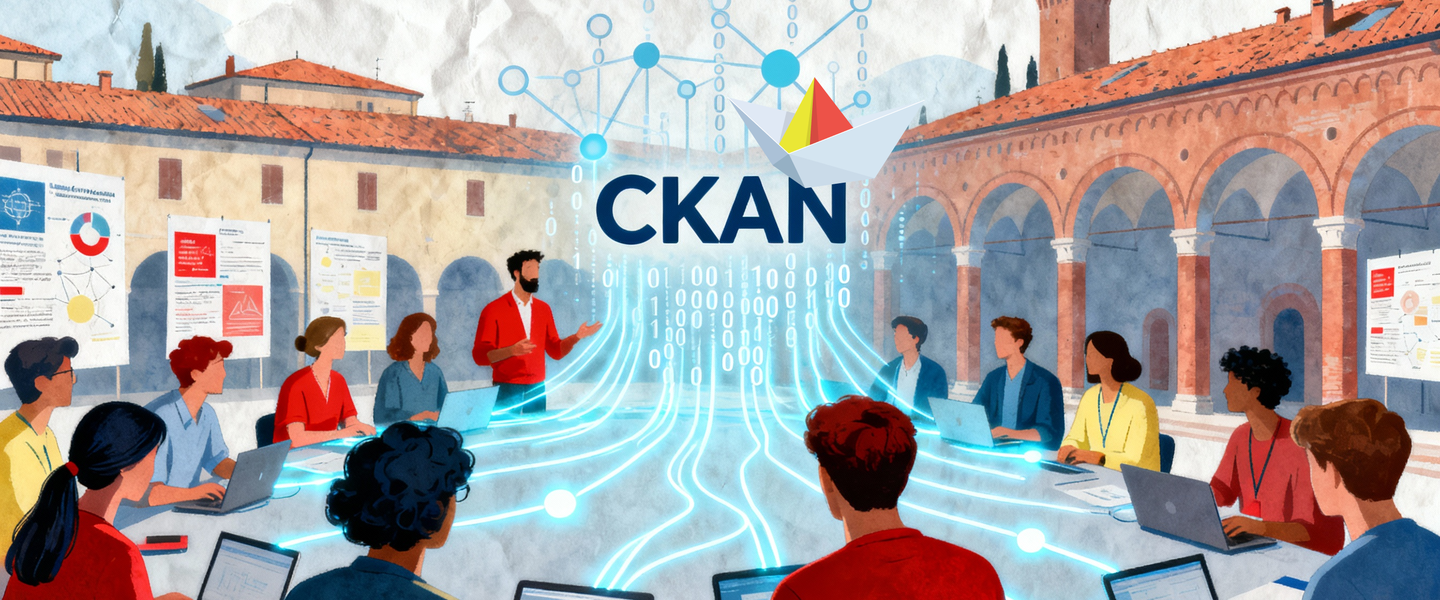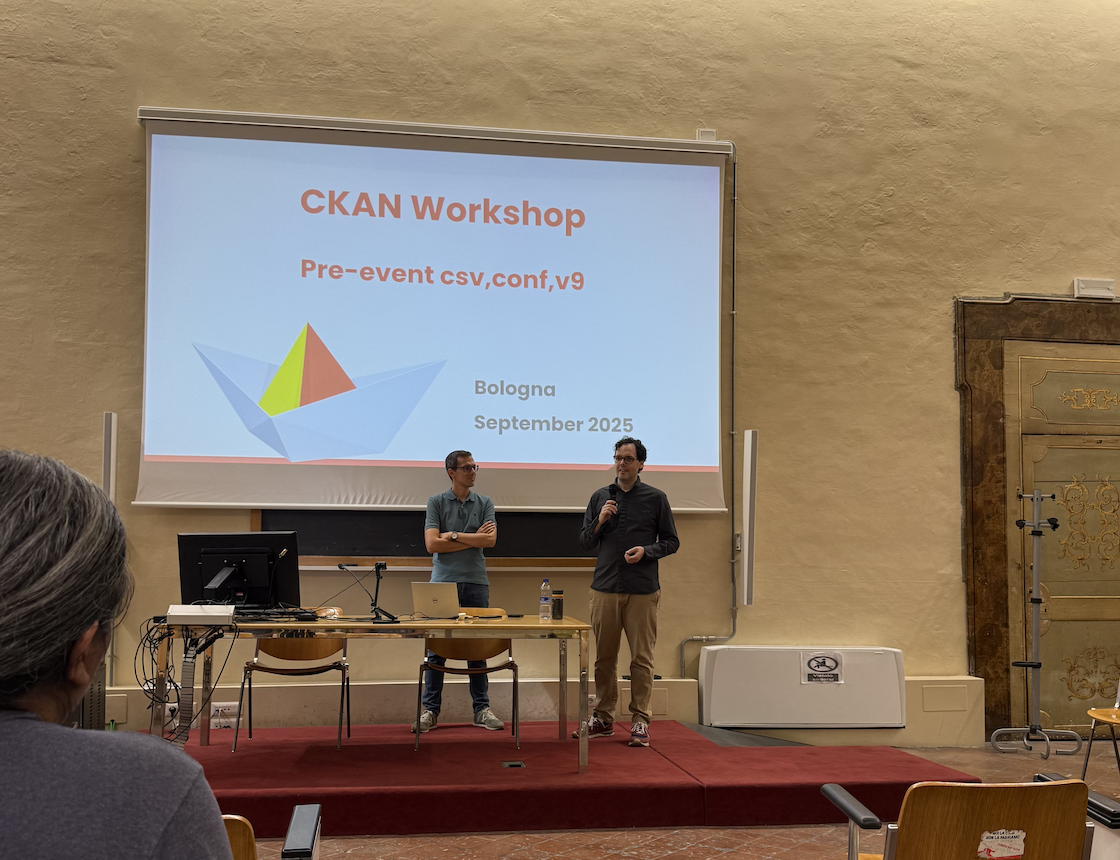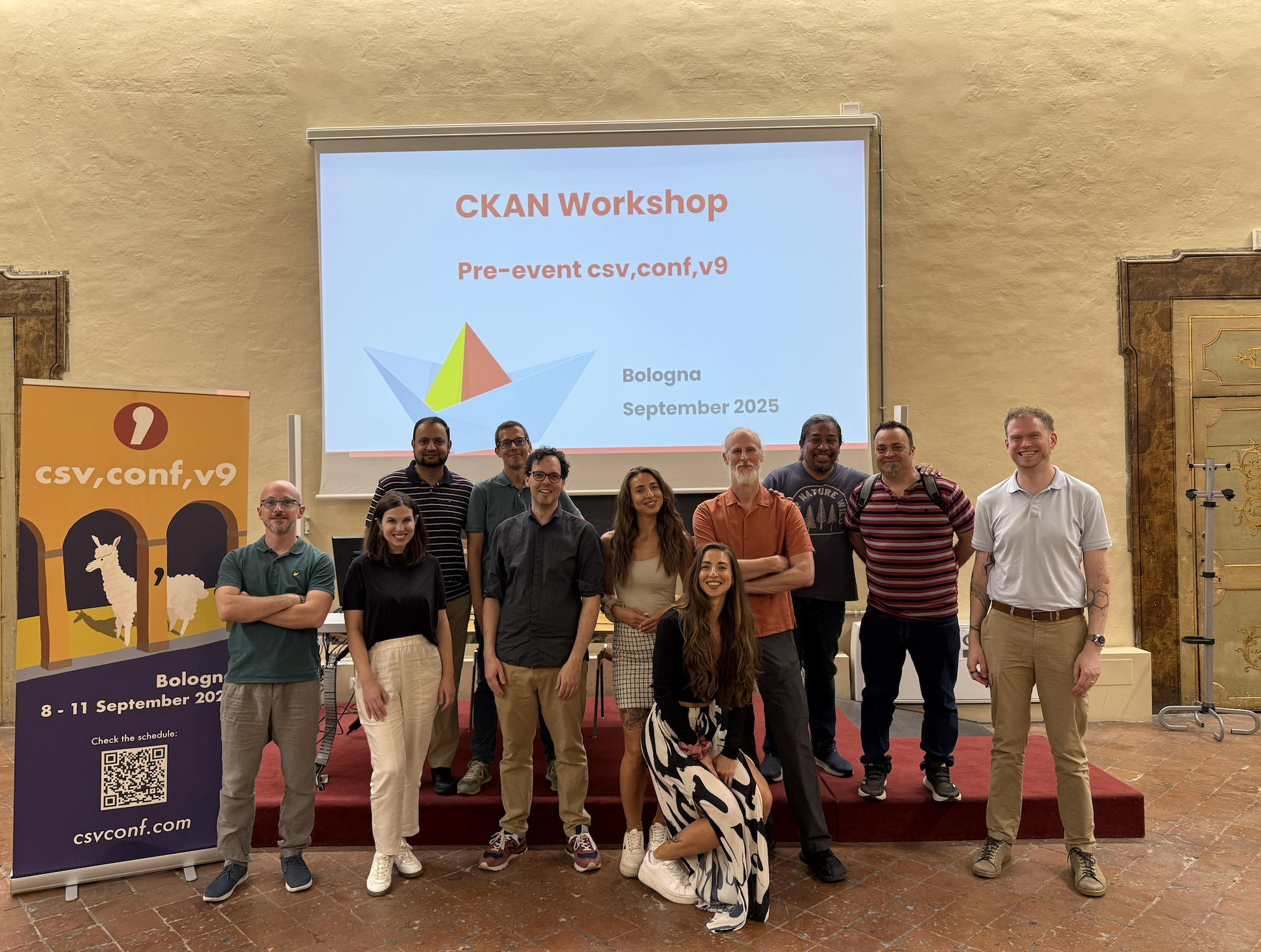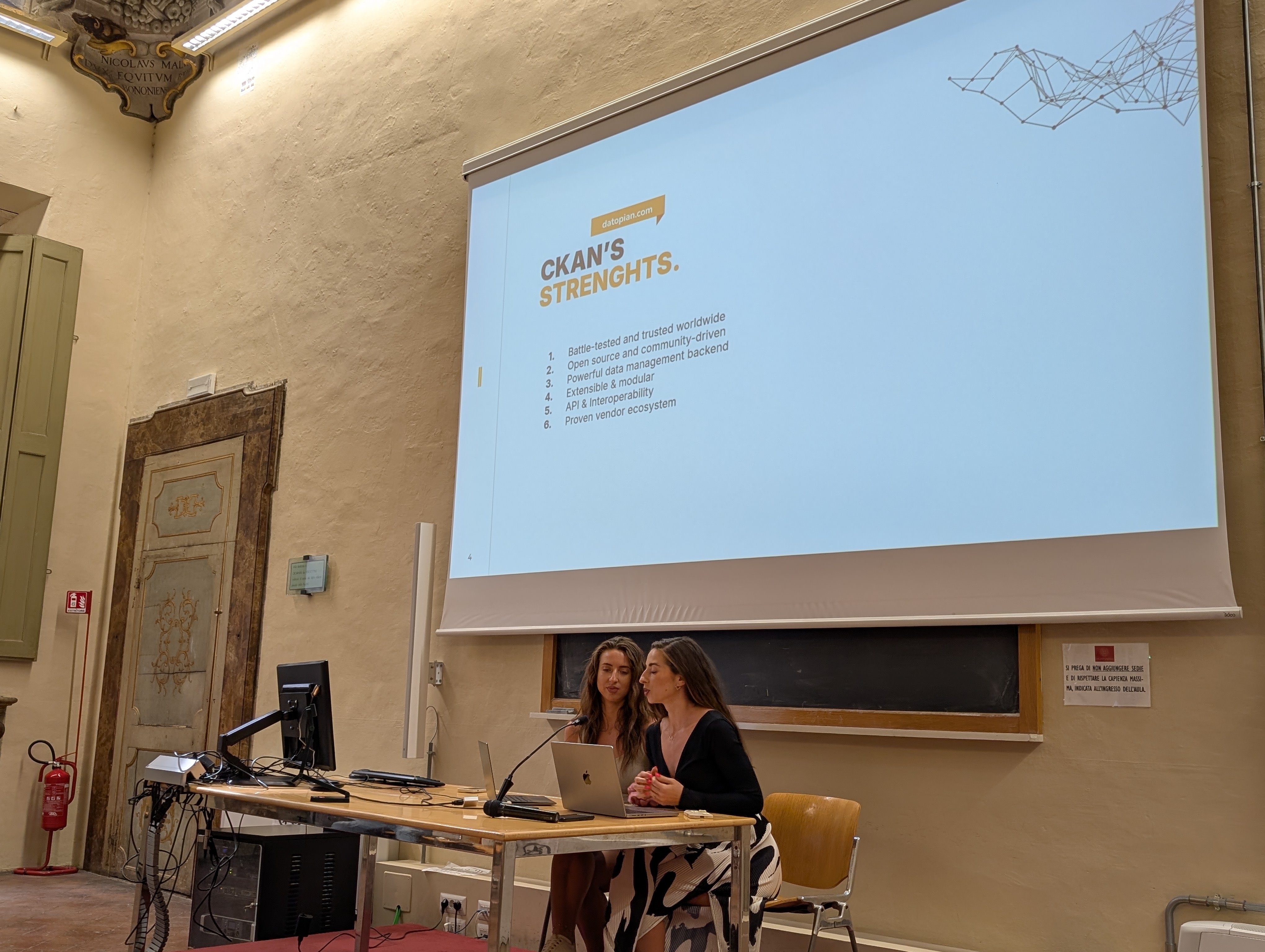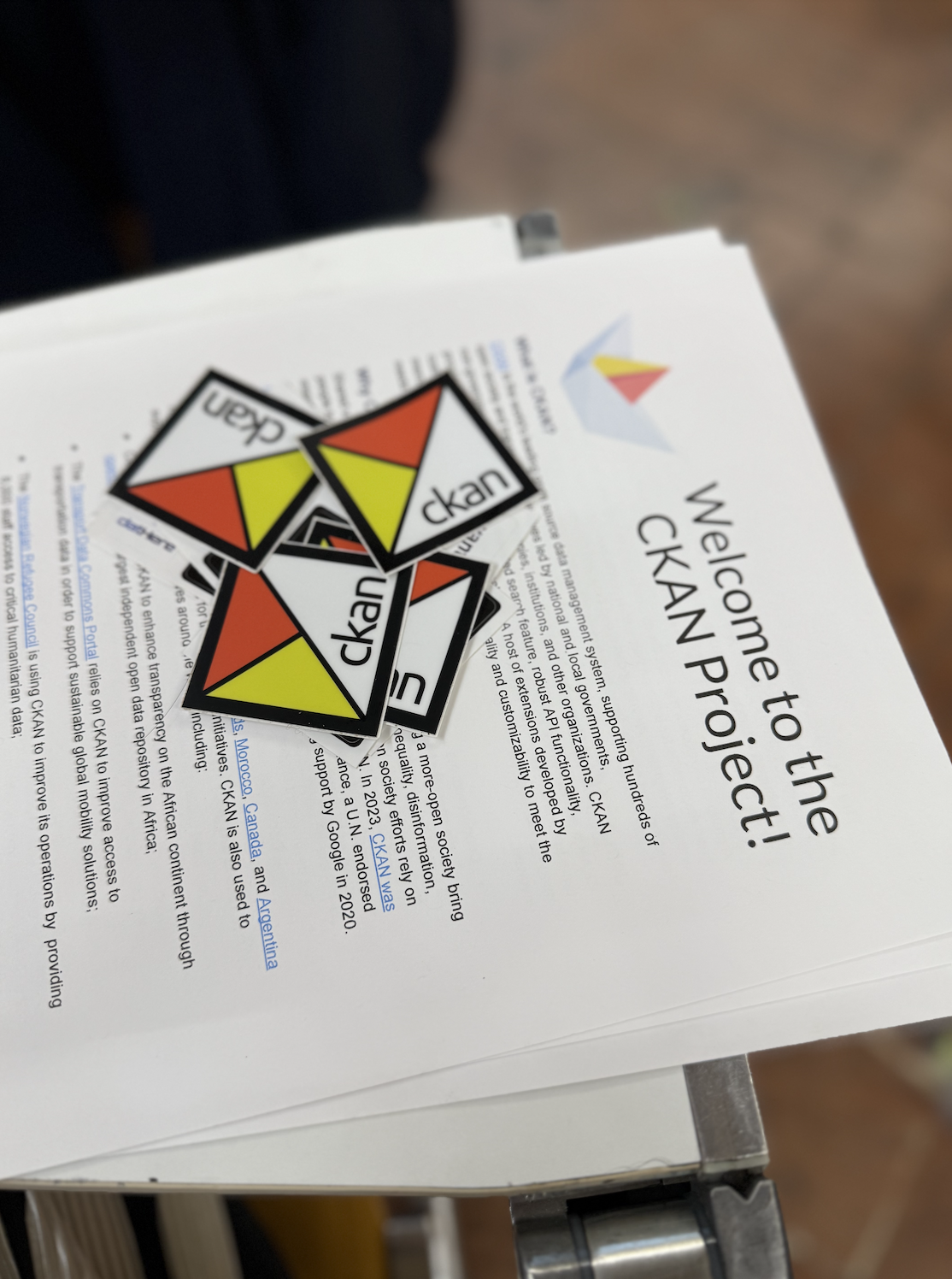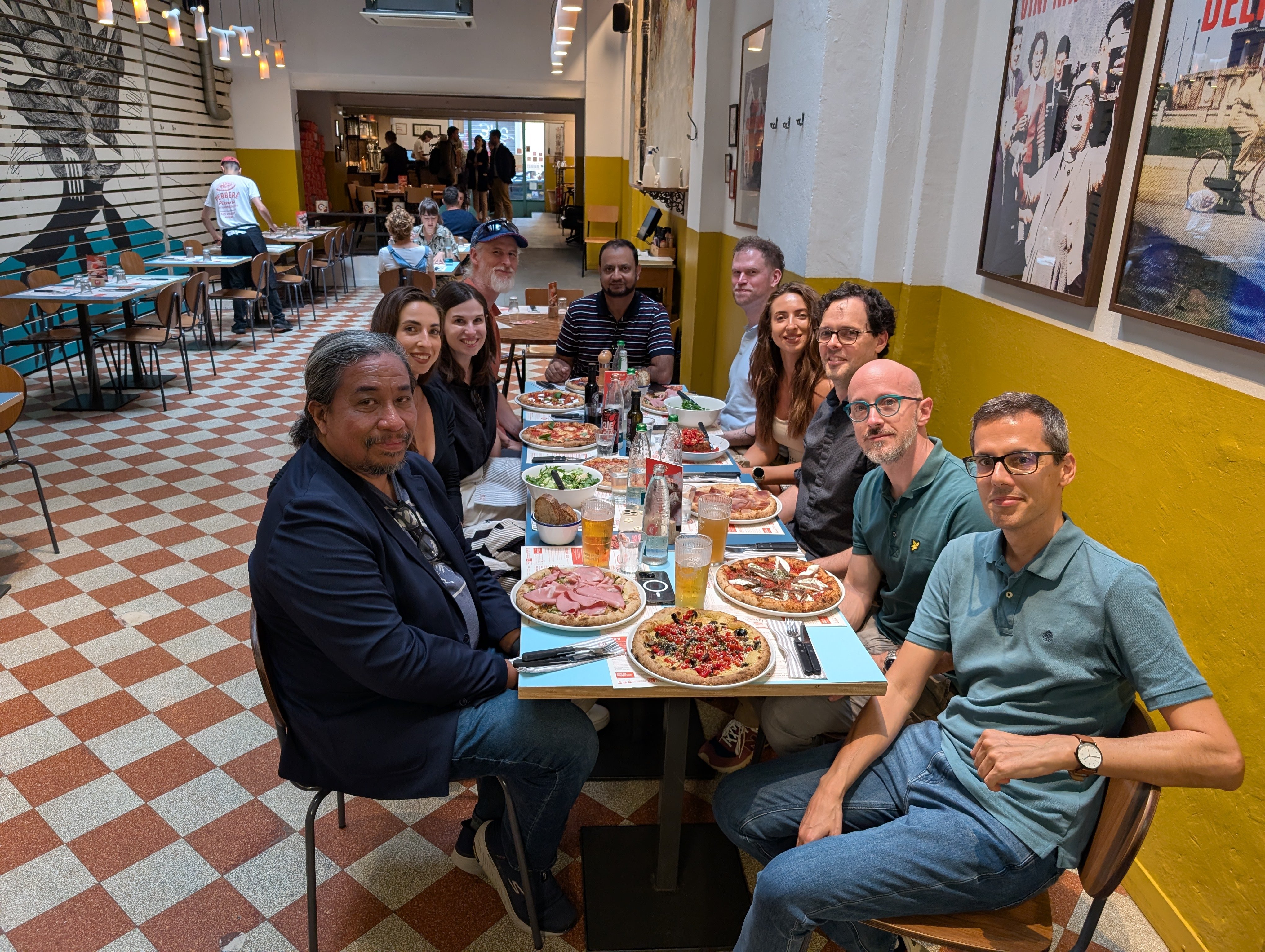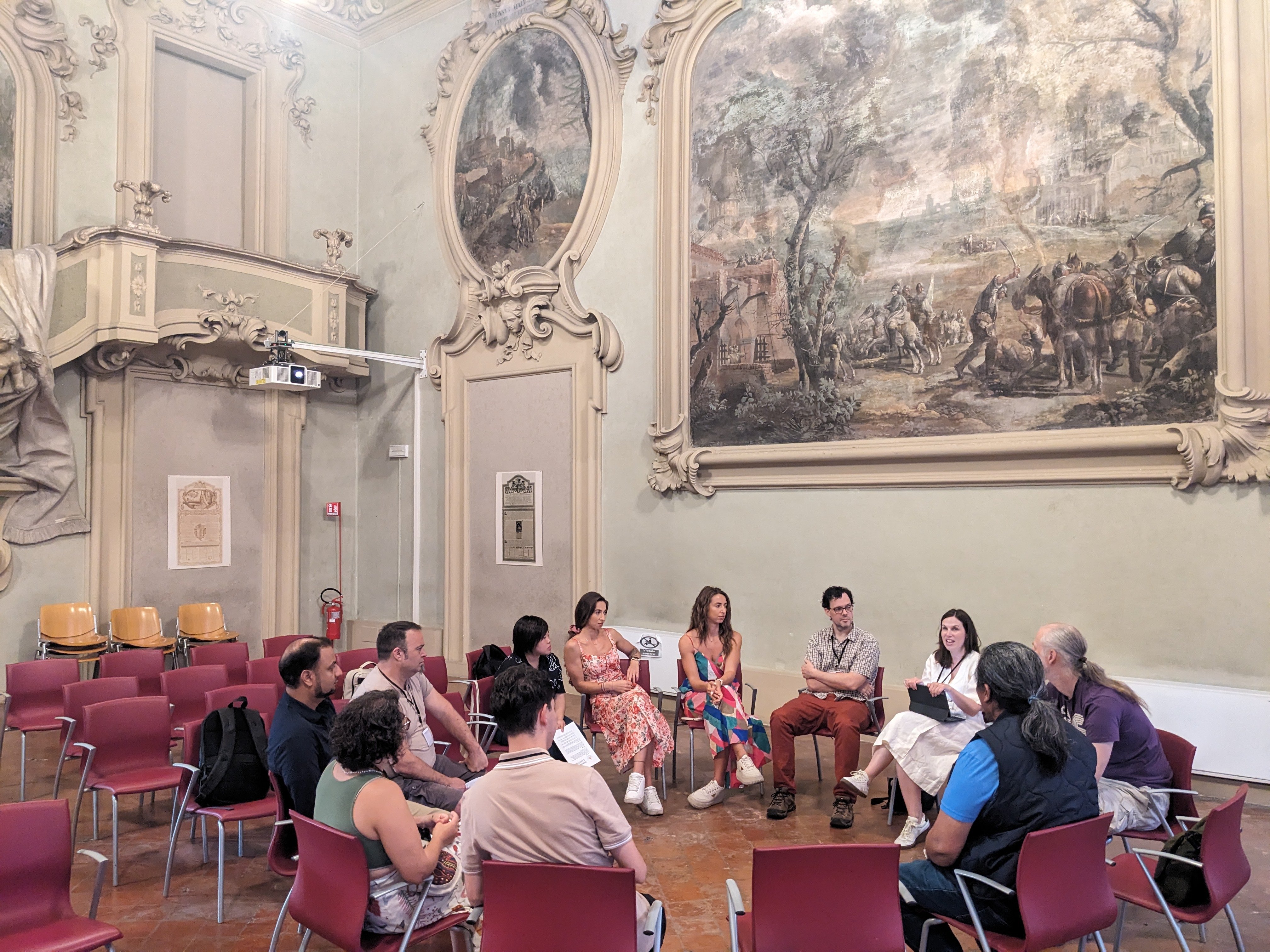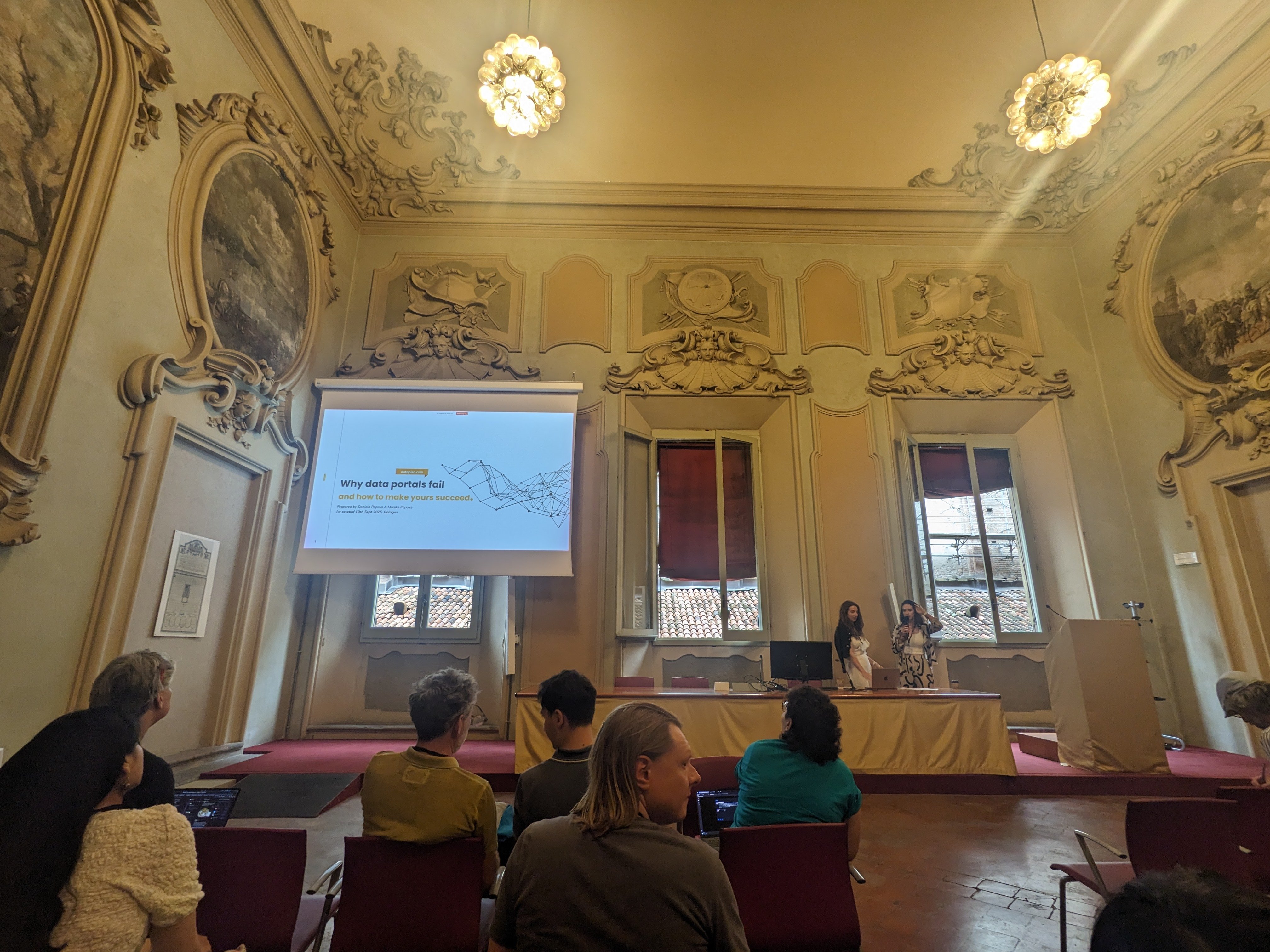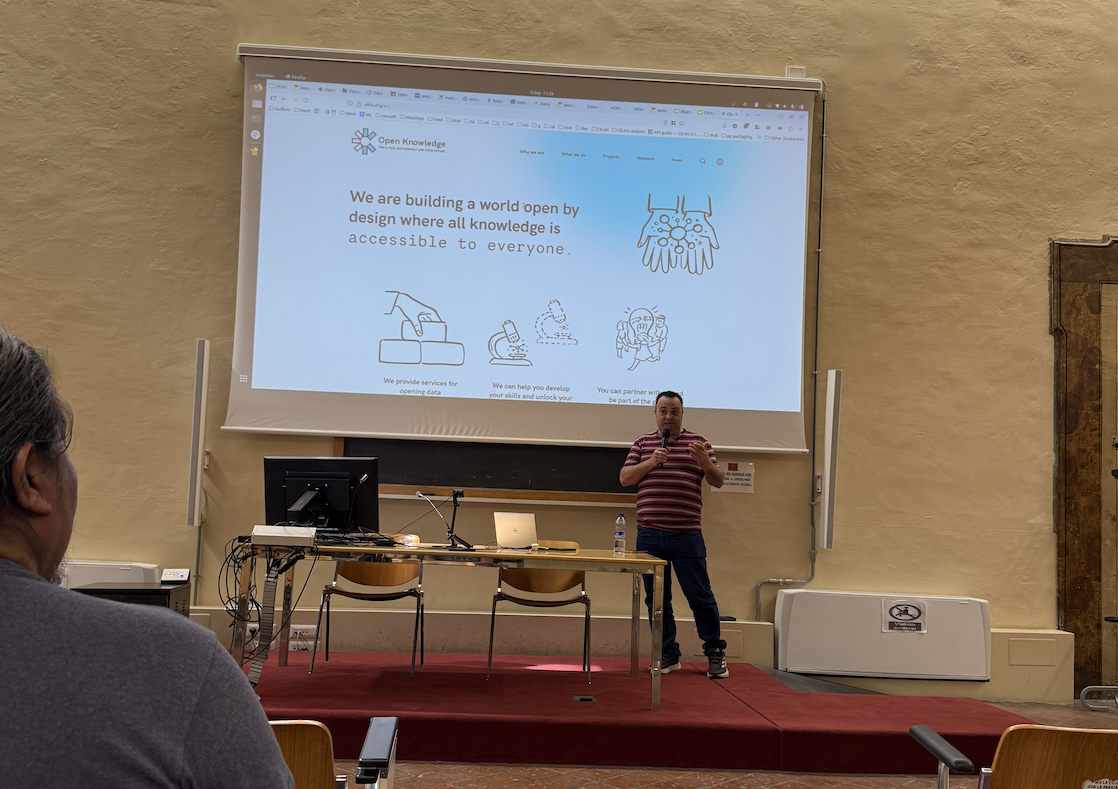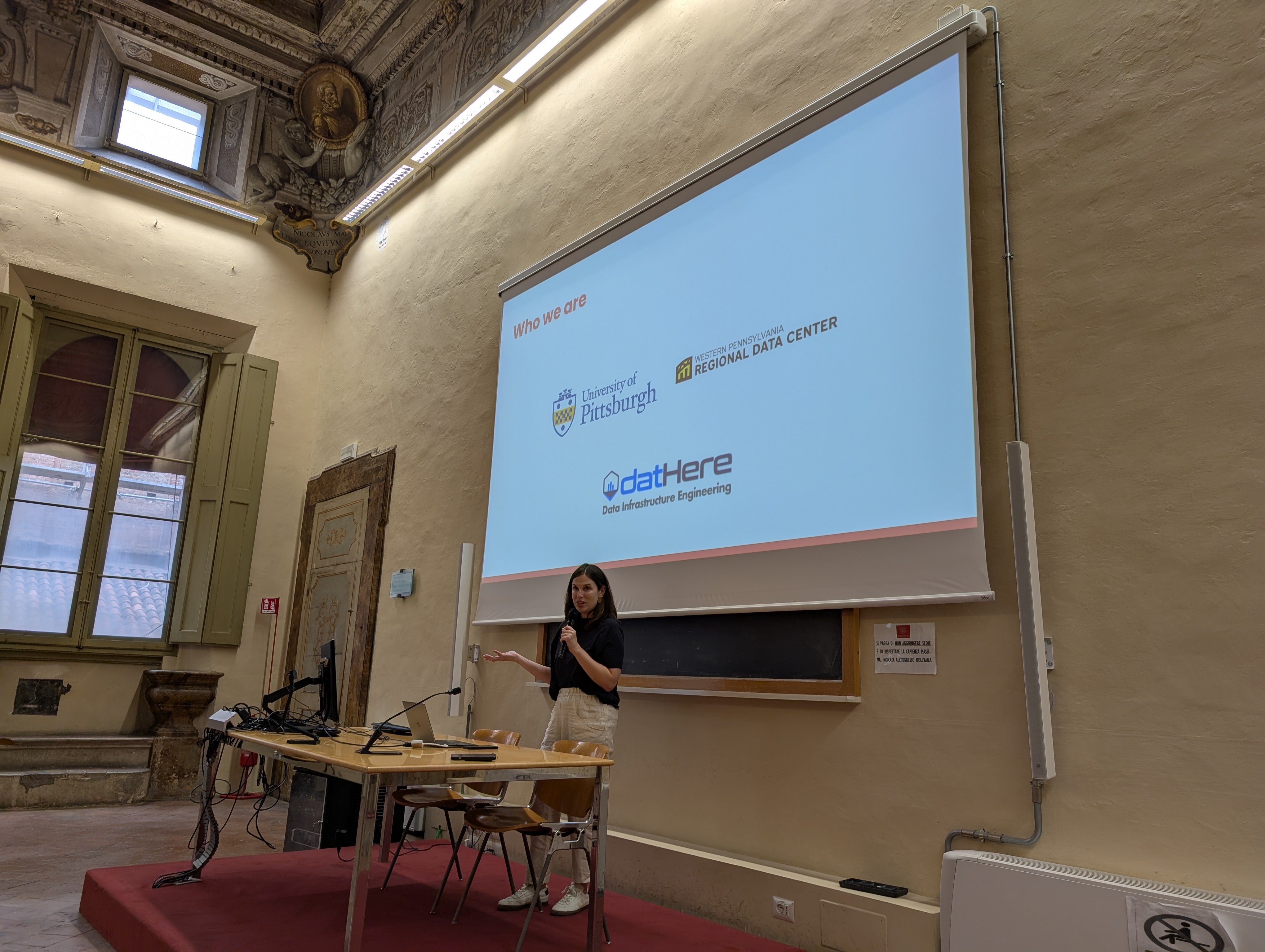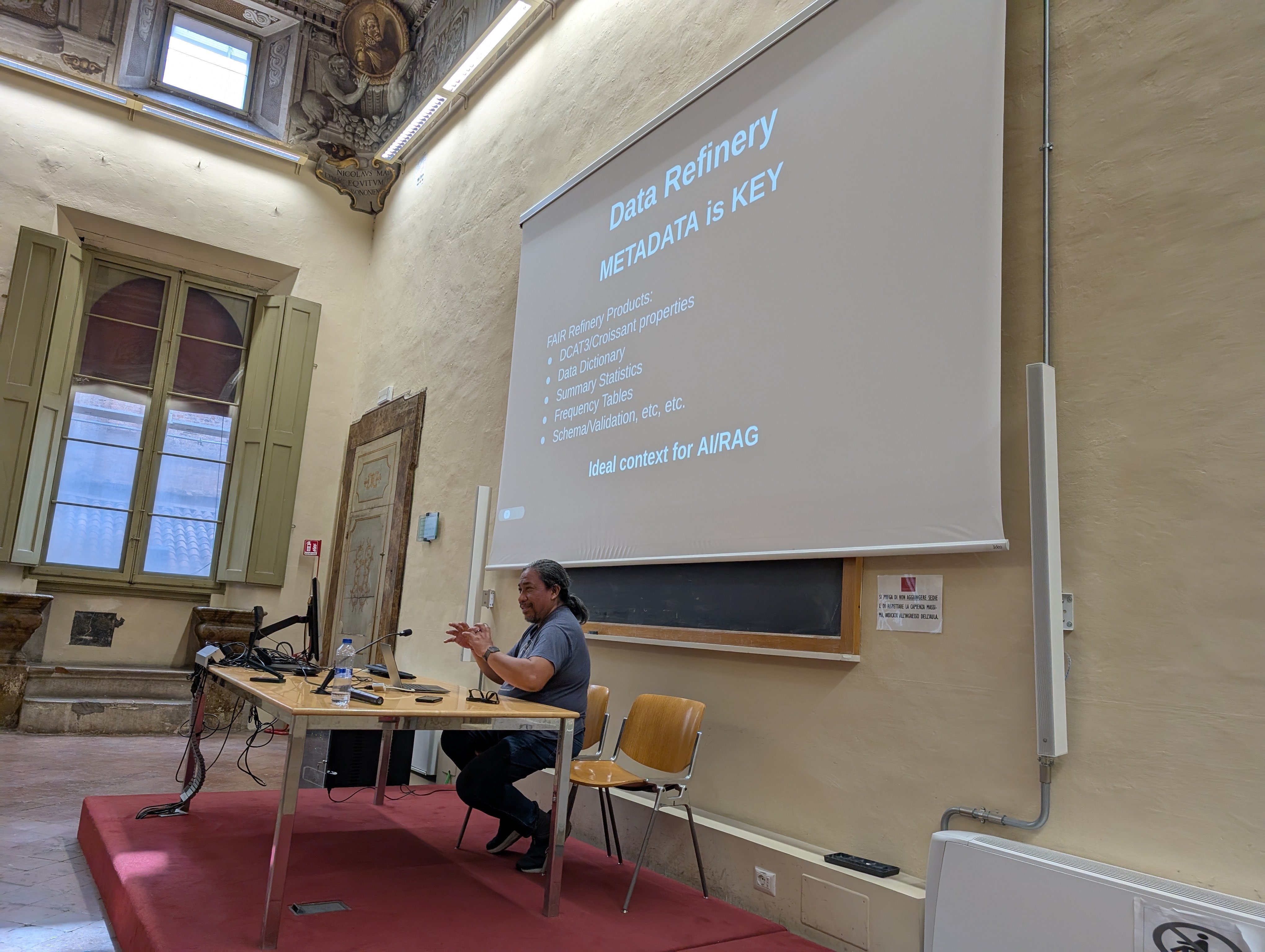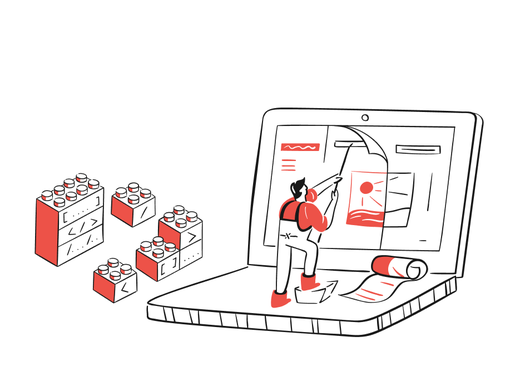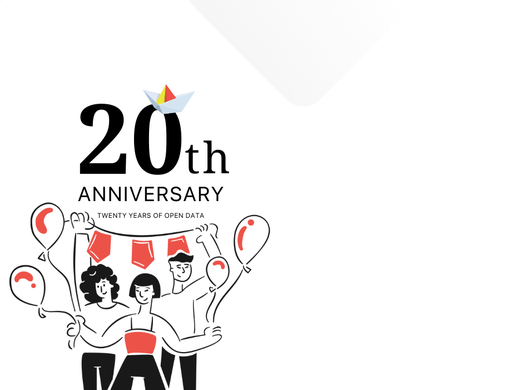In September, members of the CKAN community participated in csv,conf,v9 in Bologna, Italy.
Csv,conf is a community-driven event that has taken place in locations across the world, and highlights how data has been used for positive impact. A range of people who work with data, including developers, librarians, community organizers, advocates, and educators, have found a supportive community at csv,conf.
A celebration of “Data for Communities”
This year’s theme, “Data for Communities,” celebrated how people have used data and open technologies to improve places they call home and enhance the well-being of people who live there.
Members of the CKAN community organized a pre-conference workshop that enabled people in the community to meet face to face, learn more about how people are using CKAN for community impact, and catch up on the newest features and enhancements. The POSE project was able to sponsor travel for several members of the community to attend csv,conf,v9 in Bologna. This was done in support of a project goal of developing connections between people in the CKAN ecosystem. It is our belief that stronger relationships will lead to a stronger ecosystem.
Several members of the CKAN community shared reflections about csv,conf, the pre-meeting, and their time in Bologna, including Adrià Mercader and Ian Ward (CKAN Tech Team and Link Digital), Andrés Vázquez (Open Knowledge Foundation), Joel Natividad and Sami Baig (datHere and CKAN POSE project team), Nora Mattern (University of Pittsburgh and CKAN POSE project team), Daniela Popova and Monika Popova (Datopian), and Eric Soroos (Derilinx). They shared some reflections following the event, and we’ve grouped them into themes below.
CKAN as critical digital public infrastructure
Amid Bologna’s warm autumn atmosphere — the coffee, the chatter, the energy — one thing stood out: CKAN’s quiet, enduring presence.
What was noticeable to me was that even though it was a small conference, CKAN was present throughout session and informal conversations, so while there were no sessions directly focused on CKAN (besides our workshop), CKAN was mentioned as part of people’s stacks, or that they had interacted with a CKAN site downloading data or using the API, etc. It gave the impression that CKAN is firmly embedded in the data publishing ecosystem and is now a standard tool used in that context.
— Adrià Mercader (CKAN Tech Team, Link Digital)
I met several people who were doing work with open data. It was gratifying to see “end users” of the data that is published on CKAN. Speaking for myself, I sometimes get too lost in the details and navel-gaze on the technical aspects. At the end of the day, it’s what CKAN enables that matters. We need to let the community know that CKAN will continue to co-evolve with its community to meet the needs of the ever-changing open data landscape.
— Joel Natividad (datHere, CKAN POSE project team)
It's always encouraging to see that CKAN is being used in more places than we might expect.
— Andrés Vázquez (Open Knowledge Foundation)
These reflections echo a shared realization: CKAN has become part of the digital public infrastructure underpinning countless data initiatives worldwide. It’s not always center stage — but it’s always there, quietly enabling data exchange, transparency, and reuse.
Engaging members of the CKAN community
There is a demand for information about using and running CKAN that isn't being filled by its online presence alone. It would be great to do more events like this for communities that need better data publishing tools. The lightning talks are a great format for sharing successes from across the community. This content could be edited into a short-form format good for sharing what the CKAN community has built and what's coming in the future.
— Ian Ward (CKAN Tech Team, Link Digital)
Open Data still matters. Though it’s not as glamorous as it used to be, it does have real-world impact. One take-away I have is that we should definitely do a better job of enabling our end-users to do something with the open data beyond publishing it. Typically, CKAN’s direct end-users are the data stewards - but ultimately, the final end users are the people who use the data, and we should make it easier for both direct and indirect users to utilize the data.
— Joel Natividad
I’m a newcomer to the CKAN community through my involvement in the POSE project. Over the past couple of years, I was able to participate in listening sessions and interviews with CKAN community members from across the world to learn about their work. It was really fun to connect with people who I met on a Zoom call, often across timezones, in person.
— Nora Mattern (University of Pittsburgh, CKAN POSE project team)
The small unconference format created exactly the kind of collaborative space that communities are craving. This showed us that while the CKAN ecosystem already has strong collaborative values, there's huge potential to create more of these direct interaction opportunities where users become genuine partners in platform evolution, not just sources of feature requests.
— Sami Baig (datHere, CKAN POSE project team)
It's always positive to learn more and strengthen the bonds within the global open data community. So, my initial thought is one of gratitude to everyone who worked and collaborated to make this conference happen once again.
— Andrés Vázquez
The CKAN-first opening day felt like a CKAN family reunion - familiar faces, finally across a real table instead of a screen. The conversations were warmer, quicker, and more honest; you could feel how much unlocks when we sit together. We should show up offline more often and do more together - shared sprints, joint experiments, small wins we can ship as a community.
— Daniela Popova (Datopian)
These reflections highlight a truth the CKAN community knows well: code alone doesn’t build a platform — relationships do.
And as Monika beautifully put it:
Sustainable open data isn’t just about keeping the code alive — it’s about keeping the conversations alive. Every commit, every dataset, every meetup is a small act of shared stewardship. That’s how ecosystems like CKAN endure — through people who care enough to keep them alive.
— Monika Popova (Datopian)
csv,conf,v9 takeaways
csv,conf,v9 was a burst of real-world impact - projects from across sectors, tons of enthusiasm, and so much good work that too often stays unseen. Our conference talk with Monika on why data portals fail clearly hit a nerve: many attendees came to confirm that it was painfully real. The message was consistent - portals stall not just on tech, but on the missing bridge between published datasets and usable experiences, and that gap blocks projects and the data from being used. The best part was the hallway brainstorming. The takeaway is simple: this is solvable if we collaborate. We’ll help turn that energy into open resources and keep the conversation moving beyond the conference.
— Daniela Popova
My experience at csv,conf in Bologna demonstrated the power of inclusivity in data work, bringing together community organizers, government officials, CKAN developers, journalists, librarians, and grassroots activists around the shared theme of "Data for Communities." csv,conf was a small, intimate unconference where the format itself encouraged genuine connection, unlike massive tech conferences.
— Sami Baig
As someone in library science, it was great to connect with the library attendees and to learn about the experiences and work that they brought to csv,conf. I am part of a project called Civic Switchboard, which focuses on growing capacity in libraries to participate in their local data community. Emily Mann from the University of South Florida Libraries shared a terrific example of libraries doing partnered and thoughtful community data work. In her Data Literacy for Community Action presentation, Emily described a partnership among the academic library, the public library in St. Petersburg, FL, and a local non-project to provide health data literacy education. It was a great example of the effectiveness of partnered approaches to community data work.
— Nora Mattern
The talks were highly diverse and of excellent quality. Kudos to the conference organizing team for their great selection of presentations. I was glad to see that the event's themes weren't dominated by the superficial and hurried perspective on AI that is so common today. This is particularly noteworthy, as we are flooded with so much low-value content; the CSV Conference was a refreshing contrast. I even found a talk on a lesser-known data standard (IATI) that I needed information on, and I came away with valuable contacts and insights.
— Andrés Vázquez
I was inspired by the range of community-oriented data work that was shared at csv,conf.The presentations were a quick 15 minutes in length and there were many instances where the content shared led me to want to learn and explore more. One project that inspired me was the Choral Data Trust Experiment. Amid rapid advances in AI and the use of widespread data sources to train these systems, this project considered the rights of data creators – in this case, choristers. It’s a great example of work that is happening around participatory data governance models. Sam Milson of Open Data Manchester shared participatory approaches to contextualizing and collecting data. In the Right to the Streets project, women and girls mapped routes they take or routes they avoid in Trafford, UK - the where, the why, and the feelings they experience on the paths. This was an inspiring example of a counter-data and mapping project.
— Nora Mattern
Meeting civic technologists and government data officers (Italian Open Data) highlighted the ongoing challenges of making public data truly public. These practitioners shared insights about navigating bureaucratic processes, building trust with communities that have been historically excluded from data-driven decision-making, and creating feedback loops between data analysis and policy implementation.
— Sami Baig
For me, the highlight of the conference was Rahul Bhargava's keynote "Make Mirrors, Not Windows," which provided a framework for understanding community-centered data work. Through examples from his book "Community Data". Rahul demonstrated how data visualization should create "mirrors" that help communities see themselves more clearly rather than "windows" for outsiders to study them. The "mirrors not windows" framework crystallized this perfectly: communities want data infrastructure that helps them see themselves more clearly and build their own power, rather than platforms that primarily serve external researchers or administrators looking in.
— Sami Baig
The most noteworthy keynote for me is Rahul Bhargava’s work with community data. As an engineer who tends to get lost in the bits and bytes, I often use digital tools to do storytelling using traditional dashboards, data analyses, infographics, visualizations, etc. Rahul’s alternative way of doing it through sculpture, murals, theatre and music is most innovative. It really puts a whole new meaning towards “humanizing data.” — Joel Natividad
These perspectives capture what makes csv,conf special — an authentic space where technology meets humanity, and where open data becomes a tool for reflection, creativity, and empowerment.
Looking ahead
The U.S. National Science Foundation is strengthening the CKAN open data ecosystem through its Pathways to Enable Open Source Ecosystems (POSE) funding program. POSE was created to support open-source technologies that provide solutions to problems of national and societal importance.
csv,conf,v9 reminded us that CKAN’s greatest strength is not just its architecture — but its people.
Because open data is only as open as the communities that keep sharing, improving, and imagining it together.
The next decade of open data won’t be defined by platforms, but by participation. CKAN’s strength lies in turning users into co-creators of the commons.
— Daniela Popova
Browse the Google Drive photo gallery →
